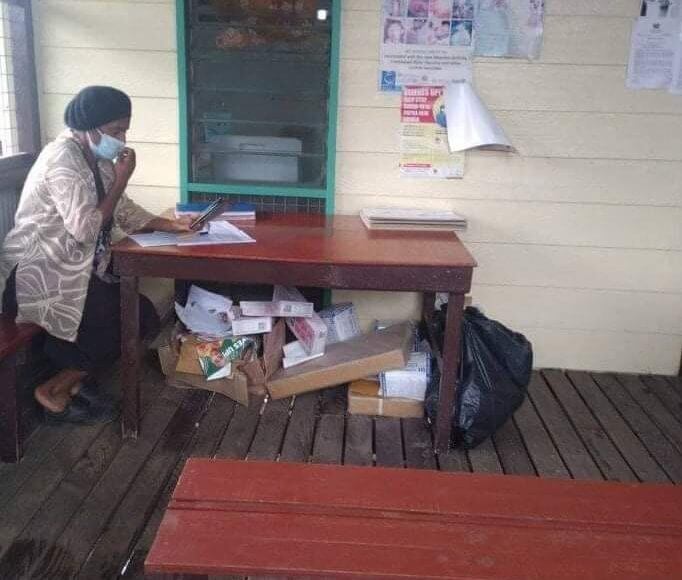Although only 65,000 suspect COVID-19 cases have been reported in Papua New Guinea over the last year, PNG’s own administrative health data show 2.6 million cases of flu- and pneumonia-like symptoms over the same period. Clearly, the pandemic is much more widespread than the official data suggests.
Win Nicholas lives and works in Port Moresby. He spoke to Professor Stephen Howes of the Development Policy Network last week.
People aren’t tested, but I personally suspect we are seeing COVID-induced deaths. Some we definitely know are COVID-19 – one of my colleagues was tested, had COVID-19 and died. But with many, we think they had COVID-19, but they also had underlying conditions, so we can’t be sure. We call them the silent dead. The number of deaths is unprecedented. We haven’t seen deaths like this before.
More than 10 people I know died in a period of just over one day. Every day people are posting condolence messages on Facebook. These are people we know – good family friends, both in Enga and in Port Moresby.
I’m from Enga and Wabag, Enga’s capital, is now a COVID-19 hot spot. I’ve spoken to a senior health officer in Wabag, and he told me that 10 people have died from COVID-19 in the month of September alone.
The Wabag General Hospital is facing staffing and medical capacity issues. More than 100 medical staff at Wabag Hospital are reported to have been infected by COVID-19 and most of them are reluctant to attend to cases.
There are no isolation facilities for COVID-19 patients. The COVID-19 patients are forced to stay out of the hospital. The hospital is running out of oxygen supply, which is the main treatment for a COVID-19 patient. Many cases are left unattended.
The Catholic hospital in Enga is full to capacity. People are waiting in queues, they are not getting the sort of treatment they should.
COVID-19 is now widespread, not only in Enga but also in Port Moresby. But many people still think things are normal. Everyone is out and about. People don’t care. I am seeing many people gathering and moving around in public places without putting in necessary COVID-19 measures, thus posing greater risk. Most of these people are not vaccinated and the chance of them being infected is very high.
Unlike during the period when COVID-19 was first detected in PNG and strict measures were introduced, the Government’s response to the pandemic is now scaled down.
Sadly the rate of vaccination in the county is very low compared to the rest of the world. This poses great risks, especially to those with underlying sicknesses. The scaled-down response is undermining support for vaccination, especially the lack of testing, as many who die do not get a definitive COVID-19 verdict.
Ever since the onset of COVID-19, people have thought that the pandemic won’t be widespread and is not that deadly. Most people were sceptical when the first COVID-19 related deaths in the country were announced. Some even claimed that the pandemic in badly affected countries was fake news. Many believe that the virus isn’t a risk in tropical climates like PNG and that the chances of infection are low. Most seem to forget that COVID-19 is a deadly disease.
Most are influenced by conspiracies promoted through social media. At some churches, pastors have been addressing their congregations on the dangers of COVID-19 vaccination.
In remote parts of the country, it’s business as usual for the populace. Basic government
I got vaccinated yesterday at work, but many of my colleagues didn’t. Only about 30 out of 200 staff took up the vaccination offer. That’s the level of response. I told them the entire world is getting vaccinated. I don’t know why people are not. People are still believing in conspiracy theories, or they are just not convinced.
We’re the working class [people with formal sector jobs]. We’re meant to show the way, we should be the first ones to be vaccinated.
Win shared some of the recent Facebook posts of his friends:
“Unbelievably too many unprecedented deaths of the loved ones. My heartfelt condolences to the grieving family in this time of sorrow.”
“Prominent public servants that have spent countless years serving this beautiful province, Enga, are dying … Over the last one week, we have lost six people that have dedicated their entire life, with kids growing up as Engans. God have mercy on us.”
Disclosure: The author is writing in his personal capacity.
This article on COVID-19 cases in Papua New Guinea appeared first on Devpolicy Blog from the Development Policy Centre at The Australian National University.
Win Nicholas was a lecturer in economics at the School of Business and Public Policy, University of Papua New Guinea, and currently works at the Bank of Papua New Guinea.
